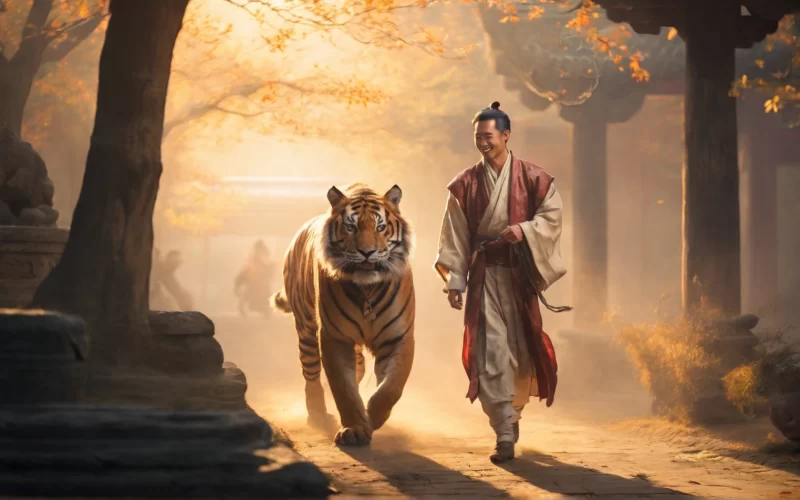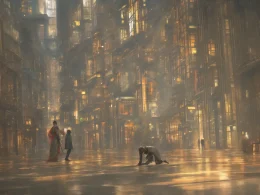Idiom Explanation:
The man who was bitten by the tiger became a ghost, and the ghost went on to lure others to be eaten by the tiger. It is a metaphor for acting as an accomplice to an evil person.
Pronunciation:
为虎作伥
wèi hǔ zuò chāng
Origin:
宋·李昉《太平广记》卷四百三十:“伥鬼,被虎所食之人也,为虎前呵道耳。”
Story:
During the Changqing period of Emperor Mu Zong of Tang Dynasty, there was a priest, Ma Zheng, who heard that there was an Elder Fu Hu living on Zhurong Peak of Hengshan Mountain. He took a child servant and went up to the mountain to visit him.
When he climbed the Zhu Rong Peak, he came to a Buddhist temple and saw an old monk with white hair. The old monk was very enthusiastic and insisted that Ma Zheng stay for dinner, but the kitchen had just run out of oil and salt. Ma Zheng asked his servant to go down the hill to buy oil and salt. The old monk accompanied him out of the temple. Ma Zheng was standing alone at the edge of the temple, watching the mountain scenery. At that time, another hermit named Ma Numa came from down the hill. After they exchanged names, he said he saw a tiger eating a man halfway up the mountain.
Ma Zheng hurriedly asked about the man's age, appearance, and clothes, and exclaimed, "That's my child servant!" Ma Zheng added, "The strange thing is that after the tiger ate the man, it suddenly turned into an old monk with white hair." Not long after, the old monk came back, and Ma Numa came to Ma Zheng's ear and said quietly, "It is this old monk."
When it was late, the old monk wanted to invite them to stay in the monk's room, but the two of them said they preferred to stay in the larder. After arriving at the larder, the two men locked the door tightly and paid careful attention to the movement outside. In the middle of the night, a tiger came to bang on the door several times, but both of them put all their strength to hold it, and the door was never broken open. The two men were determined to get rid of this man-eating tiger, and finally came up with a good idea.
The next morning, the two men lied about the strange sound coming from a well in the backyard and tricked the old monk into going to the well. When the old monk came to the well to see, Manuma seized the moment, a force, and pushed him down the well. As soon as the old monk fell into the water, he immediately showed the original form of the tiger. In order to eliminate the root of the grass, the two rushed to move a large stone, thrown into the well, the tiger was smashed alive.
After getting rid of the tiger, the two men went down the mountain, but unexpectedly, they got lost. Fortunately, they met a hunter. The hunter let them spend the night in a shack built in a tree. In the middle of the night, the two men were suddenly awakened by a noise under the tree. By the light of the moon, they saw that there were dozens of people clamoring for revenge for the tiger. The hunter hurriedly answered their questions: "These people were eaten by the tiger, but after they died, they opened the way for the tiger and became ghosts." After hearing these words, Ma Zheng scolded, "You ghosts of accomplices, who died in the tiger's mouth and still cry and take revenge for it!"
According to ancient legend, people who were eaten by tigers became ghosts after death and had to serve the tigers. This is the origin of the phrase "to act as a helper for the tiger".
Similar Idioms:
- 为虎添翼
- 助纣为虐












